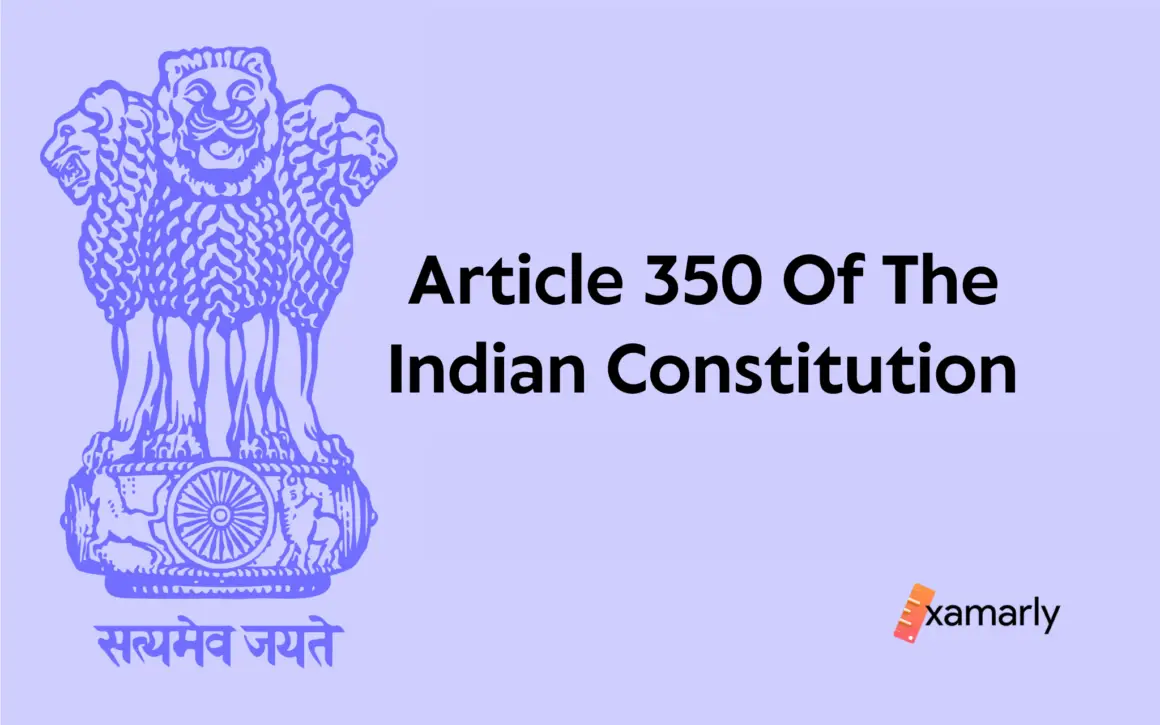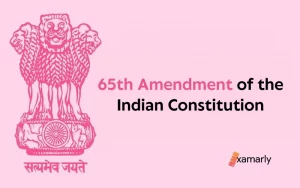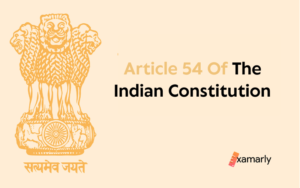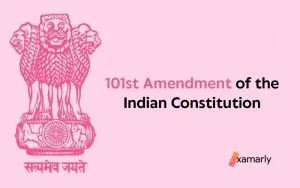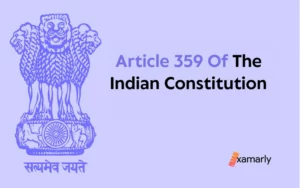What provision does the Constitution of India have for its citizens in order to address their issues and interests?
Article 350 of the Indian Constitution sheds light on the rights of Indian citizens regarding their language of communication with the Government. This article states that the President may authorize the use of any regional language in the proceedings of the Union Government and its agencies, as well as in the representations for the redress of grievances to the Union Government and its agencies.
Through this blog, we will learn about the provisions, purpose, and limitations of Article 350 of the Indian Constitution.
- Article 350 Of The Indian Constitution
- Purpose of Article 350 Of The Indian Constitution
- Constitutional Amendment Act Related To Article 350
- Article 350A Of The Indian Constitution
- Article 350B Of The Indian Constitution – Special Officer For Linguistic Minorities
- Conclusion
- FAQs Related To Article 350 Of The Indian Constitution
- Which part of the Indian Constitution does Article 350 belong to?
- Which Articles of the Indian Constitution are included in Part XVII called "Official Language"?
- Which schedule of the Indian Constitution talks about Official Languages?
- Which languages are mentioned in the Eighth Schedule of the Indian Constitution?
- When was Article 350 of the Indian Constitution adopted?
- To whom can a representation be submitted for the redress of grievances under Article 350 of the Indian Constitution?
- Can a person submit representation in any language to the Union or State government as per Article 350 of the Indian Constitution?
- What is the significance of Article 350 in the Indian Constitution?
- What does the provision under Article 350A of the Indian Constitution relate to?
- What do you mean by "Linguistic Minority"?
- Does the Indian Constitution provide for the use of regional languages as official languages?
- Who is a Special Officer for Linguistic Minorities?
- How did the Seventh Amendment Act, 1956 modify Article 350 of the Indian Constitution?
- How do Articles 350, 350A and 350B work together in the Indian Constitution?
Article 350 Of The Indian Constitution
Article 350 of the Indian Constitution is a provision that deals with the use of language in representations for the redress of grievances. Let’s take a closer look on its clause for a better understanding.
The Clause – As it is & Explained
Every person shall be entitled to submit a representation for the redress of any grievance to any officer or authority of the Union or a State in any of the languages used in the Union or in the State, as the case may be.
The above statement is a provision of Article 350 of the Indian Constitution that guarantees the right of every person to submit a representation in a language of their choice when seeking redress of a grievance. In other words, it ensures that individuals have the right to communicate their grievances to the Union Government and State Government officers or authorities in a language that they are comfortable with.
This means that if a person lives in a state where a particular language is spoken, they have the right to use that language when making a representation to a government officer or authority. Similarly, if an individual is more comfortable communicating in a language that is used in the Union, they have the right to use that language as well.
Purpose of Article 350 Of The Indian Constitution
The purpose of Article 350 of the Indian Constitution is to ensure that individuals are able to effectively communicate their grievances to the government and that their rights are protected. It also reflects the multilingual nature of India, where there are many different languages spoken across the country.
By allowing individuals to use the language of their choice when communicating with the government, this provision helps to promote inclusivity and equity in the governance process. It also empowers people to use their mother tongue to express their feelings or grievances, so that they feel more comfortable.
However, it is important to note that this provision only applies to representations for the redress of grievances. This means that it only applies when individuals are seeking to address a problem or complaint. It does not apply to general interactions with the government or to situations where individuals are not seeking to address a specific grievance.
Constitutional Amendment Act Related To Article 350
The Seventh Amendment Act, 1956 made several changes to the Indian Constitution, including modifications to Article 350. From its Statement Of Object and Reasons, we learn that Article 350A and Article 350B were inserted in the Constitution of India after Article 350.
Article 350A Of The Indian Constitution
Article 350A of the Indian Constitution is considered important for the cognitive development and overall educational achievement of children from linguistic minority groups.
The Clause – As it is & Explained
It shall be the endeavour of every State and of every local authority within the State to provide adequate facilities for instruction in the mother-tongue at the primary stage of education to children belonging to linguistic minority groups; and the President may issue such directions to any State as he considers necessary or proper for securing the provision of such facilities.
Article 350A of the Indian Constitution states that it shall be the responsibility of every state and local authority within that state to provide adequate facilities for instruction in the mother tongue at the primary stage of education for children belonging to linguistic minority groups.
Additionally, it gives the President of India the power to issue directions to any state for the purpose of securing the provision of such facilities. This article aims to ensure that children from linguistic minority groups have access to education in their mother tongue, which is considered to be important for their cognitive development and overall educational achievement.
Article 350B Of The Indian Constitution – Special Officer For Linguistic Minorities
The main purpose of this Article 350B of the Indian Constitution is to provide for the protection and promotion of the interests of linguistic minority groups in India.
Clause 1 – As it is & Explained
(1) There shall be a Special Officer for linguistic minorities to be appointed by the President.
The first clause of Article 350B of the Indian Constitution provides for the constitution of a Special Officer for Linguistic Minorities, who would be appointed by the President of India.
Clause 2 – As it is & Explained
(2) It shall be the duty of the Special Officer to investigate all matters relating to the safeguards provided for linguistic minorities under this Constitution and report to the President upon those matters at such intervals as the President may direct, and the President shall cause all such reports to be laid before each House of Parliament, and sent to the Governments of the States concerned.
In its second clause, Article 350B of the Indian Constitution specifies the duties and responsibilities of the Special Officer.
The Special Officer would be responsible for reporting to the President on the working of the safeguards provided for linguistic minorities under the Constitution and to investigate any matter relating to the safeguards so provided and report on the same to the President.
The Special Officer would also be responsible for enquiring into specific complaints with respect to the deprivation of rights and safeguards of linguistic minorities and take steps for redressing such grievances. This person would also be responsible for encouraging the study of languages and culture of linguistic minorities by suitable institutions.
This Article is in line with the aim of Article 350A which is to ensure education in the mother tongue for Linguistic Minorities, the officer would work as a watchdog for these rights and report any violation to the President for necessary action.
Conclusion
In conclusion, Articles 350, 350A, and 350B of the Indian Constitution play a crucial role in protecting and promoting the rights and interests of linguistic minority groups in the country.
Article 350 of the Indian Constitution lays down the provision that facilitates the citizens of India to use any language they are comfortable with, to communicate with the Union or State, while Article 350A and 350B work together to ensure that linguistic minorities have access to education in their mother tongue and have a special officer to protect their rights and take action on any complaints.
These provisions in the constitution aim to promote linguistic and cultural diversity in India, and help to ensure that the country’s linguistic minorities are not left behind in terms of education and cultural preservation. It is important for the government and other stakeholders to take these articles seriously and ensure their implementation in order to protect the rights of linguistic minorities and promote a truly inclusive society in India.
To Know More About Official Languages And Related Provisions, Read –
- Article 343 Of The Indian Constitution
- Article 344 Of The Indian Constitution
- Article 345 Of The Indian Constitution
- Article 346 Of The Indian Constitution
- Article 347 Of The Indian Constitution
- Article 348 Of The Indian Constitution
- Article 349 Of The Indian Constitution
- Article 351 Of The Indian Constitution
FAQs Related To Article 350 Of The Indian Constitution
Which part of the Indian Constitution does Article 350 belong to?
Article 350 of the Indian Constitution belongs to Chapter III (Special Directives) of Part XVII which is called Official Language.
Which Articles of the Indian Constitution are included in Part XVII called “Official Language”?
Part XVII of the Indian Constitution deals with the Official Languages of India and includes Article 343 to 351.
Which schedule of the Indian Constitution talks about Official Languages?
The Eighth Schedule of the Indian Constitution mentions the Official Languages of India.
Which languages are mentioned in the Eighth Schedule of the Indian Constitution?
The Eighth Schedule to the Constitution consists of the following 22 languages:- (1) Assamese, (2) Bengali, (3) Gujarati, (4) Hindi, (5) Kannada, (6) Kashmiri, (7) Konkani, (8) Malayalam, (9) Manipuri, (10) Marathi, (11) Nepali, (12) Odia, (13) Punjabi, (14) Sanskrit, (15) Sindhi, (16) Tamil, (17) Telugu, (18) Urdu (19) Bodo, (20) Santhali, (21) Maithili and (22) Dogri.
When was Article 350 of the Indian Constitution adopted?
Draft Article 301H (Article 350 of the Constitution of India 1950) was adopted on 14th September 1949.
To whom can a representation be submitted for the redress of grievances under Article 350 of the Indian Constitution?
Article 350 states that a representation can be submitted to any officer or authority of the Union or a State in any of the languages used in the Union or in the State, as the case may be.
Can a person submit representation in any language to the Union or State government as per Article 350 of the Indian Constitution?
Yes, Article 350 of the Indian Constitution allows every person to submit a representation for the redress of any grievance in any language to any officer or authority of the Union or a State in any of the languages used in the Union or in the State, based on the circumstances and requirements.
What is the significance of Article 350 in the Indian Constitution?
Article 350 of the Indian Constitution lays down the provision that facilitates the citizens of India to use any language they are comfortable with, to communicate with the Union or State. It allows for people to submit representation in the language they are comfortable with, which could be important for linguistic minorities, ensuring their representation in the redress of any grievances and their rights to be heard in a language they understand.
What does the provision under Article 350A of the Indian Constitution relate to?
The provision under Article 350A of the Indian Constitution is related to providing facilities for instruction in mother tongue at the primary stage.
What do you mean by “Linguistic Minority”?
“Linguistic Minority” refers to a class of people whose mother tongue is not the same as that of the majority in a state or part of a state. The Constitution of India provides for the protection of the interests and culture of linguistic minorities. According to the Census of 2011, nearly 36.3 million out of the 1.2 billion strong population of India speak an “absolute minority language”, a language that forms a minority in all the states of India.
Does the Indian Constitution provide for the use of regional languages as official languages?
The Indian Constitution does not explicitly provide for the use of regional languages as official languages. However, it does provide for the use of regional languages in government and official communications as per the provisions of individual state governments.
Who is a Special Officer for Linguistic Minorities?
An officer appointed by the President of India with the responsibility to safeguard the rights of linguistic minorities of the country is referred to as “Special Officer for Linguistic Minorities”.
How did the Seventh Amendment Act, 1956 modify Article 350 of the Indian Constitution?
Article 350A and Article 350B were added to the Indian Constitution through the Seventh Amendment Act, 1956.
How do Articles 350, 350A and 350B work together in the Indian Constitution?
Together, these articles work towards protecting and promoting the rights and interests of linguistic minority groups in India by ensuring their right to use any language they are comfortable with, to communicate with the Union or State; adequate facilities for instruction in their mother tongue at the primary stage of education; and a special officer to protect their rights and take action on any complaints.


